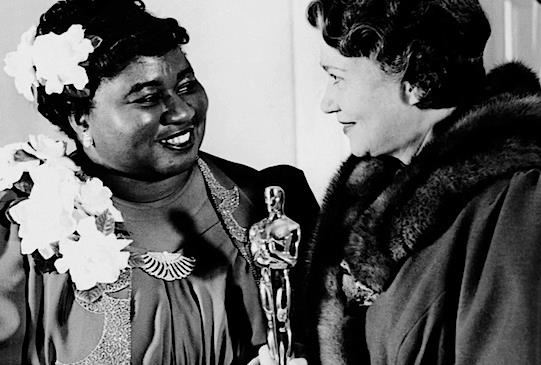

From Wichita to Hollywood: Honoring Hattie McDaniel
October 21, 2024
Hattie McDaniel was a Wichita-born actor most often known for being the first African American to win an Academy Award—and that barely scratches the surface of all she accomplished. The upcoming exhibition “Honoring Hattie McDaniel: Past, Present, and Future of Representation in Media Arts,” organized by the Tallgrass Film Association and The Kansas African American Museum with support from a Humanities For All grant, will explore McDaniel’s contributions to film history and her storied life off-camera.
“The things about Hattie that impress me the most are the things she did outside of film,” says Kevin John Goff, McDaniel’s great-nephew. Not only was she a successful actor, she was also a singer-songwriter, a drummer with the chops to play with jazz greats like Jelly Roll Morton, and an activist who led a movement that would eventually get racially restrictive housing covenants overturned by the Supreme Court.
As a child, Goff loved black-and-white movies and recalls sneaking out of bed to catch late-night broadcasts of classic films like Casablanca and Gone with the Wind (for which McDaniel won the Academic Award for Best Supporting Actress). He remembers seeing Black characters on the screen, but he wouldn’t realize until much later that some of those actors were his relatives. Now, he is the keeper of Hattie McDaniel’s legacy and has dedicated himself to researching and sharing McDaniel’s story.
Hattie McDaniel wins Academy Award for Best Support Actress
The upcoming exhibition in Wichita will include a visit to the site of McDaniel’s family’s former home, a conversation with Goff at The Kansas African American Museum, a screening of In This Our Life (1941), starring McDaniel, and a panel discussion about Black representation in film, including the history and evolution of Black cinema.
According to Melanie Addington, executive director of the Tallgrass Film Association, the purpose of the exhibition is to “keep the reminder of how important [McDaniel’s] legacy is, not just to the world but to Wichita, because she completely changed the industry.”
Goff hopes that visitors to the exhibition will walk away understanding that what made his great-aunt special was more than what they see of her on the silver screen; it was “her commitment not just to herself but to other people. Even in the face of adversity, during tough times—and she had tough times her whole life—she persevered through it all. She didn’t quit.”
The Hattie McDaniel exhibition will be part of the Tallgrass Film Festival, October 24-27. More information can be found at here.
Join the Movement of Ideas
-
ATTEND The Tallgrass Film Festival October 24-27 in Wichita.
-
LEARN about Hattie McDaniel’s remarkable life, explore her filmography, and discover amazing facts (ex: Hattie McDaniel is credited as the first Black artist to sing on the radio) at hattiemcdaniel.com.
-
VISIT The Kansas African American Museum in Wichita.




